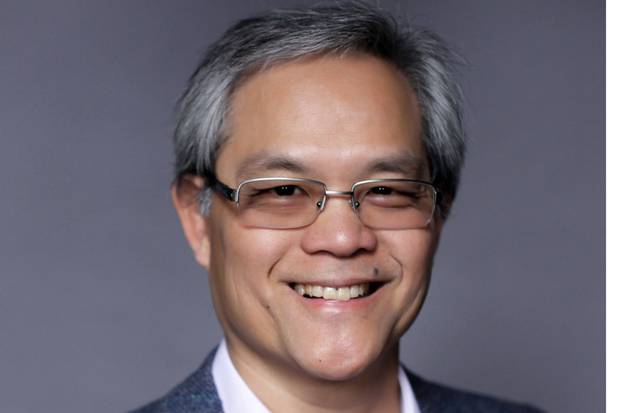Vielight’s technology sends light therapy into the body by, among other things, sticking a sensor on your nose.
Vielight
If you're an innovative Canadian health-care company, boosting international exports is always a challenge but Vielight Inc. believes it can get up your nose.
The Toronto-based firm is marketing a technology called brain photomodulation – a method of infusing light therapy into the body by, among other things, sticking a sensor on your schnozz.
"The light can actually activate cells in the body to help recovery," says Edward D'Mello, Vielight's communications and brand manager. Vielight transmits near-infrared light, invisible to the naked eye – the idea is that the light transmits energy directly to cells, relieving pain and generating cell regrowth.
Vielight's devices also have sensors that slip over your head like a hat – think of those things on Brainiac's noggin in older Superman comics. Full units retail for $1,749 (U.S.), with accessories that can be added.
The technology is based on discoveries made by Vielight's chief executive officer and founder, Lew Lim, who worked in Silicon Valley to pioneer the technique of introducing therapeutic photonic (light) energy into the human body.
The goal is to build the company in new markets now. Healthy growth is an issue in more than one way for innovative Canadian companies in the health-care sector.
For decades, Canadian businesses have been striving to advance the country's export economy beyond raw materials and manufactured goods to add innovative technologies and services, tapping into huge global potential.
In health care, it can be complicated. Though Canadians are world-renowned for everything from the discovery of insulin to inventing Pablum, health-related products and services are subject to regulations and guidelines that differ among countries and trading blocs.
For example, while the benefits of various kinds of light therapy are recognized by experts, Vielight does not yet have Health Canada or U.S. Food and Drug Administration approval for its products as medical devices.
The company has conducted a pilot study with 19 Alzheimer's disease and dementia patients. But for now, "Health Canada has permitted us to market our devices on the condition that we do not make any medical claims until our [clinical trial] has concluded," Mr. D'Mello says.
The study is expected to be completed this fall. Both Health Canada and the U.S. FDA classify Vielight's devices as "certified as safe for consumer use," with the U.S. categorizing the products as "low-risk general wellness devices." Gaining certification as medical devices would be a huge boost, Mr. D'Mello says.

Vielight’s technology is based on discoveries made by company founder, Lew Lim, a pioneer in introducing therapeutic photonic (light) energy into the human body.
Vielight
Other types of Canadian health-care sector companies face different hurdles.
Jeff Ruby is founder and chief executive officer of Newtopia Inc., with offices in Toronto and New York. After losing his father to cancer, he developed a program that enables individuals and health insurers to build personal wellness programs based on information you provide about your lifestyle and a "simple saliva test," which means gathering your DNA.
The individual customers Newtopia looks for are what Mr. Ruby calls "predisease" – people who are in good shape but may be genetically predisposed to health problems later on. The aim is to work with these individuals to design personal lifestyle programs that will maximize their chances of staying healthy, and keeping costly U.S. health insurance premiums down.
"Our focus is on the U.S. market," Mr. Ruby says. "We partner with employers or insurers to develop these very personalized disease prevention programs."
Submitting to a DNA test is entirely voluntary; those who do provide DNA and receive Newtopia's personalized healthy living program can potentially lower their health insurance costs in the complicated U.S. market, where President Donald Trump is still scheming to undo Obamacare.
"We're a risk mitigation tool. The average healthy employee in the U.S. will pay about $3,400 per year (U.S.) in medical insurance premiums," Mr. Ruby says.
"Once they're diagnosed with diabetes that can jump to $15,000; for heart disease it can go up to $20,000 per year. We focus on sustainable ways to change peoples' habits."
He says he focuses on the United States partly because, with universal health care, Canadians don't worry about health insurance as much.
"Canada can be a really difficult place to innovate in health," he says. "We don't have the economic pain point they have in the U.S., where just about every company with more than 500 employees is on the hook."
Many Canadian startups, in other sectors as well as health care, say it's also challenging to raise capital to innovate in Canada.
On the other hand, Canada's growing power as a technology centre helps innovators.
"We're already advanced in Canada in applying machine learning to health care, says Anna Goldenberg, head of machine learning at Hospital for Sick Children in Toronto.
We're making progress as innovators generally – in 2015 the Conference Board of Canada noted that three out of the five fastest growing exports since 2005 were in services.
"There's great excitement in our potential – to see what we can do," Dr. Goldenberg says.